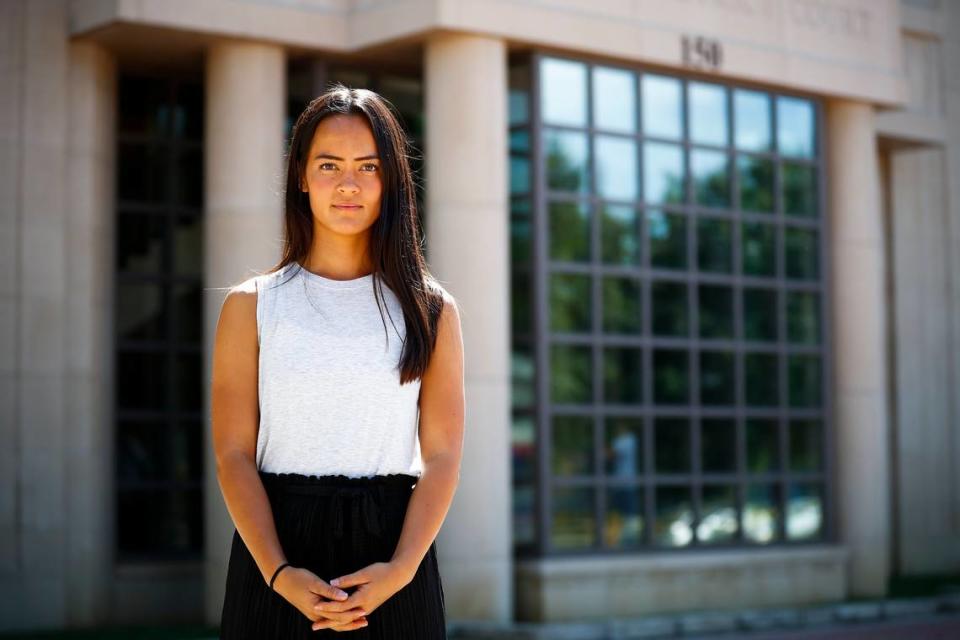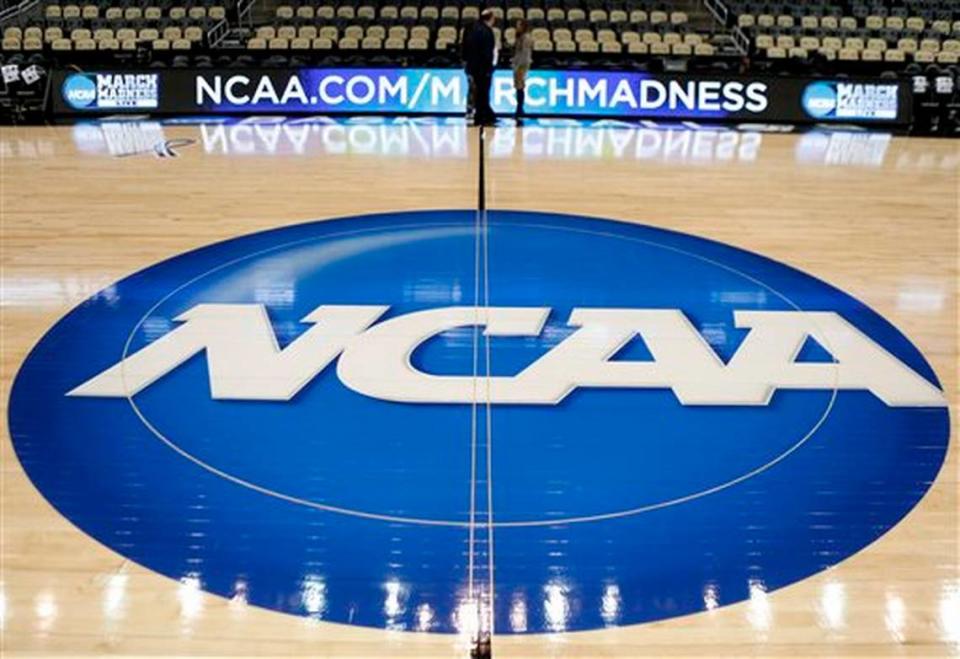University of Kentucky Title IX lawsuit: What happened during the three-day trial?
The University of Kentucky Title IX lawsuit alleging that the school does not offer equal opportunities for women athletes went to trial this week, though a ruling hasn’t yet been issued.
Lawyers for UK argued the university has expanded opportunities for women in sports, adding more than 100 female athletes in the last 10 years and a varsity stunt team. Additional women’s sports have not been added because of the results of an interest and ability survey, where students self-report their ability to play a sport at the collegiate — specifically Division I — level, they said.
UK does not meet the requirements of Title IX, lawyers for the student athletes argued, which says schools have to provide sufficient opportunities for women athletes. Multiple requests have been made to elevate women’s club sports to the varsity level, including the field hockey, lacrosse and equestrian teams, but the university determined there was not enough interest among its current student body to create teams in those areas.
Before adding stunt in 2021, UK had not added a women’s varsity sport under Athletics Director Mitch Barnhart, who has been at UK since 2002, according to the lawsuit.
The trial before District Judge Karen K. Caldwell in the U.S. District Court in Lexington was a bench trial, meaning there was no jury. Caldwell will rule on the case at a later date, with lawyers for both sides meeting next week to further discuss details related to the lawsuit.
The case was originally filed by two UK students in 2019, but soon after became a class action lawsuit against the university. Ala Hassan, the class representative who testified this week, told the Herald-Leader she hopes the case will lead to the creation of more sports for women at UK.
“I hope that we will see more women’s sports added in the future, the near future,” Hassan, who lives in Lexington and graduated from UK this year, said at the end of the trial. “I’m determined. After hearing everything from both sides, I’m determined to see women’s sports grow.”

Interest and ability survey
Much of the trial centered on UK’s interest and ability survey, given to freshman, sophomore and junior students each academic year. Students are asked if they have interest in and the ability to play a list of sports at the collegiate level, several witnesses testified.
If a student self-reports the ability to play on the collegiate level, the survey then asks for their accolades in the sport if they would meet a series of requirements. Students can leave their contact information on the survey, which could result in a coach contacting them, Sandra Bell, executive associate athletic director, testified.
The survey is sent to students annually, and is required to be completed before students are allowed to register for classes, witnesses said. Three students testified they recalled taking the survey once in their time at UK.
Virginia Lacefield, a research data analyst at UK who assisted with creating the updated survey, said it is sent to students in early February, giving them more than six weeks to complete the survey before class registration. The majority of students complete the survey within two to four minutes, Lacefield said.
Student responses help UK determine if enough students on campus would be able to sustain a new sport. If a club team approaches the athletics department about elevating the program, the survey is one of the metrics used to gauge if it would be sustainable at UK, Bell said.
Barnhart said there had been several requests for elevating sports from the club level to the varsity level in his tenure at UK, including men’s ice hockey, women’s lacrosse, triathlon and equestrian. After meeting with students from those groups, results from the survey were not enough to support creating a team, Bell and Barnhart testified.
The trial also looked at the “three-prong test” related to Title IX:
Substantial proportionality, meaning a school’s ratio of female participation in athletics is close to the ratio of female enrollment
A history and pattern of adding participation opportunities
Full and effective accommodation of athletic interests of women.
When Judge Caldwell asked if UK had met “substantial proportionality” in the most recent school year, UK’s lawyer Bryan Beauman said the university had not.

UK students testify
Elizabeth “Lisa” Niblock, one of the first students to sign onto the lawsuit, testified she played Division I lacrosse at Furman University in South Carolina before transferring to UK in the spring of her freshman year. Niblock was an accomplished high school lacrosse player recruited by several D-1 programs.
She transferred because she wanted to attend a larger college and be closer to family, she said. At UK, she inquired about the club lacrosse team, which is entirely student-run.
The club president said the team was “less of a commitment than high school” lacrosse, and was not the competitive experience she was looking for, Niblock said.
“I wanted at least something more committed than high school,” Niblock said. “I had just played at a very high level.”
Niblock didn’t try out for the club team and instead officiated high school and college lacrosse matches. While Niblock’s testimony was focused on lacrosse, she said she hopes to see sports of different varieties added at UK.
“I want to give those females an opportunity and the scholarships they deserve,” Niblock said.
Hassan was also a high school lacrosse player who transferred to UK. She played on the club lacrosse team for one season, but did not make the team the next year.
She recalled the interest and ability survey one time, and said she hurried through the survey in order to register for classes. She wanted to play lacrosse at UK, but answered “no” when asked if she had the ability to play Division I lacrosse because she hadn’t played the sport for a year.
Hassan said she was upset at the “lack of opportunity for women at the University of Kentucky” to play varsity sports.
“It doesn’t just apply to me,” Hassan said. “It applies to all women at UK and any woman who could potentially go to UK.”
Georgia Murray, another UK student, is the president of the UK club equestrian team. She is an accomplished equestrian and was recruited by Oklahoma State University for their varsity equestrian team, but chose UK for its biomedical engineering program.
Murray was one of the students who met with Bell and requested that equestrian be elevated to varsity status. Murray said she and other team members prepared a pitch and met with Bell and other athletics administrators.
“Being in Kentucky, the prospect of what our team could be is really exciting,” Murray testified.
However, Bell later told Murray there was not enough interest to sustain an equestrian team, Murray said.
Bell testified that equestrian had long been a sport that UK had gathered data on to potentially add as a varsity sport, but there was not enough interest among current students reported through the survey.
Athletics at UK
While students said they didn’t feel UK offered enough opportunities for students, Beauman argued the number of women athletes at the university has grown more than 50% in the last 10 years.
Beauman said the university researched potential and growing sports to provide more opportunities for students. Bell testified that UK frequently gathered information about growing sports, sometimes before or without students approaching the university to elevate their teams.
Equestrian, triathlon, lacrosse and field hockey were all teams that Bell and her staff monitored for interest, she said. While those sports may have growing interest nationwide, that doesn’t automatically mean it becomes a varsity sport at UK.
“No one school can offer every sport,” Bell said, later adding, “If you’re going to make a choice (to add a sport), make a choice that fits.”
Bell has been a longtime UK Athletics employee, and has worked in Title IX compliance for the university. She previously was the senior women’s administrator within the athletics department. She said she attended high school and college before Title IX was created and did not have the opportunity to compete in athletics.
Bell said she takes pride in the opportunities UK gives to its female athletes, and said her job is “extremely gratifying.”
“I’m very proud of that, and grateful to have been a part of the process,” Bell said.


